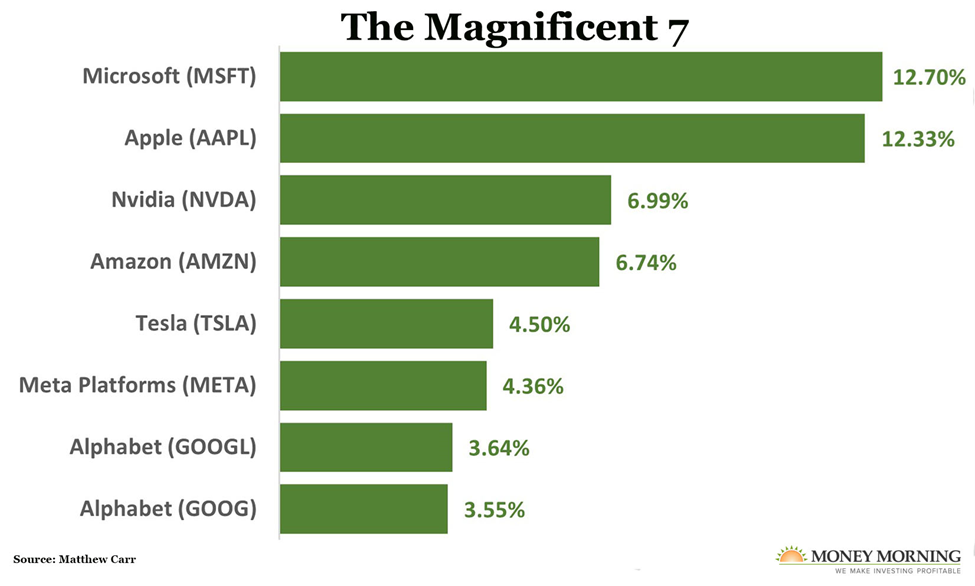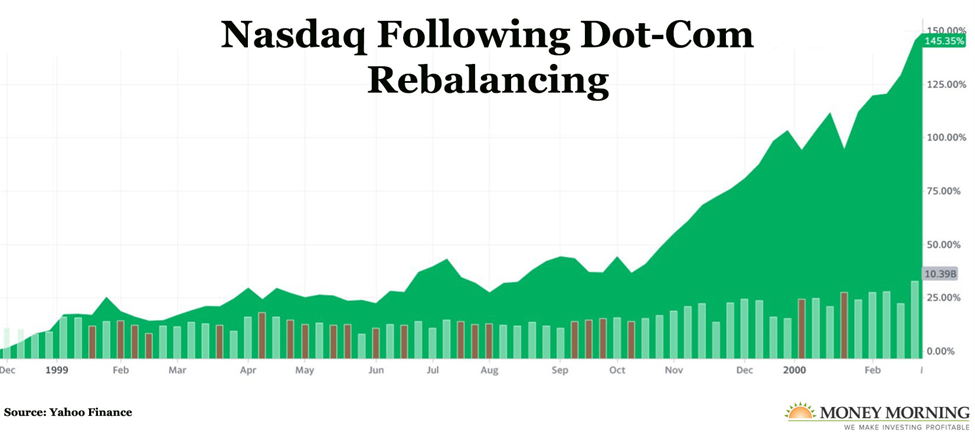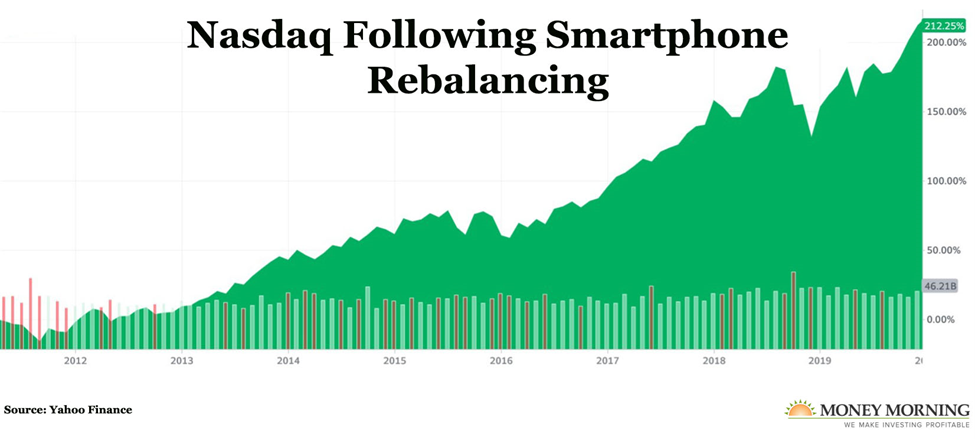Tech is king.
Forget oil & gas... Set aside consumer staples or some farfetched belief that industrials are the place to be... Ignore financials, because not even the companies that control our cash can compete with what the tech sector rakes in.
There was a time successful portfolios were built on a foundation of names like General Electric (GE), Honeywell (HON), Johnson & Johnson (JNJ), Kimberly-Clark (KMB), Schlumberger (SLB), and Walmart (WMT).
But those were times when cameras required film, one half of all restaurants sat in a constant fog of cigarette smoke, and mailboxes across the country were stuffed to the gills with AOL discs granting limited access to "the world wide web."
Tech is king.
It killed all those things and more.
And if your portfolio was packed with those favorites of the "blue hairs," your retirement has underperformed... not just this year, but for decades.
You are behind the times - and running out of time.
With each evolution and revolution, tech becomes larger... more ingrained... more powerful... too powerful. And there are moments when something must be done.
One of those moments is today.
But is it a second chance for the "left behinds"? Or is it the beginning of the end... for now?
The Dot-Com Rebalance
You know the breakthroughs...
The internet.
Smartphones.
Artificial intelligence (AI).
Over the last three decades, these have reshaped our world and the markets. And in more ways than you might think.
They've helped drive the leaders of these tech trends to dangerous heights.
In December 1998, Microsoft (MSFT) was the biggest thing on the planet... literally.
Personal computers populated homes, Windows introduced a true operating system, replacing DOS, and the browser wars were well underway.
The digital world was our oyster and Microsoft its pearl.
Bill Gates' brainchild ballooned to meteoric proportions. After a millionaire-minting run of 4,828% from January 1990 to the start of December 1998, Microsoft accounted for 25% of the entire Nasdaq 100's weight.
That's a truly hefty proportion, especially as we were in the dizzy days of the Dot-Com craze.
But there was a larger issue looming for the Nasdaq and its megaton Microsoft problem... the launch of the ProShares QQQ Trust ETF - which would eventually become the Invesco QQQ ETF (QQQ).
This exchange-traded fund proxy for the Nasdaq 100 was set to debut in March 1999.
But regulations stipulated no individual company could account for more than 24% of an ETF's weight. That meant the Nasdaq had to go on a diet and cut out as much Microsoft as it could.
Of course, trimming the fat of one was a benefit to the smaller players. And wouldn't you know it, like an uneven load in a washing machine, the Nasdaq re-entered a wobbly cycle as one of those smaller players become dominant... too dominant.
The Smartphone Rebalance
On May 2, 2011, tech stocks faced a new conundrum. This time, not from Microsoft, but from Apple (AAPL).
Steve Jobs had revived the Silicon Valley darling and transformed it into a globe-spanning behemoth. It dipped its hands into consumers' pockets and extracted ever-increasing amounts of money as the iPod, iPhone and iPad rocketed in popularity.
This catapulted Apple to being the most powerful company in the markets. Its weighting on the Nasdaq 100 inflated to 20.49%.
It's also important to note, Apple was one the main benefactors of the 1998 Microsoft rebalancing.
So, the real kicker was, even though the iPhone maker's market cap was only 44% larger than Microsoft's, thanks to the rebalancing, Microsoft accounted for a mere 4.91% of the tech index's weight. Its influence on the market was considerably less.
Once again, to balance the powers that be, Apple's weight was cut to 12.33%. Meanwhile, Microsoft's weight increased to 8.32%.
At the time, the question was, "Who will be the next Nasdaq powerhouse?"
Will it be Microsoft?
Will it be Cisco (CSCO) or Yahoo!, Intel (INTC) or Applied Materials (AMAT)?
Does this mark a top for Apple?
Well, what followed shouldn't have surprised anyone...
AI, FAANGs, and the Magnificent 7
For more than a decade, one group of stocks powered the markets higher.
They even earned a catchy acronym, the FAANGs - Facebook, - now Meta Platforms (META) - Amazon (AMZN), Apple (AAPL), Netflix (NFLX), and Google - now Alphabet (GOOGL).
They accounted for an outsized portion of the Nasdaq and S&P 500's gains for years.
Now, in 2023, the FAANG acronym is shelved, replaced by the "Magnificent 7."
This group includes Alphabet, Amazon, Apple, Meta, Microsoft, Nvidia (NVDA), and Tesla (TSLA). Largely fueled by the demand for AI, these seven now account for 54% of the Nasdaq 100's weight...

And surprise, surprise... the two companies that triggered the only two special rebalancings in Nasdaq's history are now part of the reason for forcing a third.
One that takes place today.
Now, we don't know what the final weights will be yet. We'll find out in moments. But much has been made of what to expect.
That said, I only deal in facts. And all I can tell you is what has happened to the markets in the past following our previous special rebalancings.
The upside... it's been good!
From December 1998 to March 2000, the Nasdaq rallied more than 145%...

The adjustment had no impact on the tech index's continued surge and ultimate collapse.
From May 2, 2011 to February 2020, the Nasdaq sprinted 212% higher...

As with the dot-com rebalance, it had no impact on the rally that was well underway. In fact, tech stocks wouldn't crater until the COVID-19 bear market in mid-February 2020.
And what about the impact on certain individual names? Well, let's look at the facts...
Microsoft's explosive growth was the reason for the first rebalance.
Apple's rise to dominance was the reason for the second rebalance.
Today, Apple and Microsoft, along with some other familiar, high-growth names, are the reason for the third.
Tech is king.
And groundbreaking innovations bending the world to their whims are unstoppable. Not only in the impact on our daily lives, but also in our portfolios.
We saw this during the dot-com days. We watched it unfold again during the smartphone surge. And it's happening again with the rise of AI.
Don't be afraid. Embrace it... if you haven't already or you're one of the "left behinds." Your future self and retirement will thank you.
Here's to high returns,

Matthew
P.S. Shah Gilani is laser-focused on the impact of AI. In a little more than 24 hours from now, he'll be holding a special presentation... just in time. You see, he's going to be talking about the small companies poised to benefit from the AI boom. And I'm sure many of them are names not on anyone's radar at the moment. To attend this presentation, sign up here!


